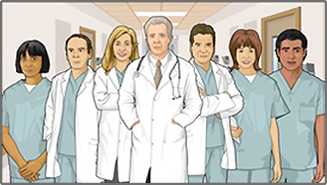- Animal bites - self-care
- Antiplatelet medicines - P2Y12 inhibitors
- Back pain - returning to work
- Back pain and sports
- Bathing a patient in bed
- Bicycle safety
- Bile acid sequestrants for cholesterol
- Bleeding during cancer treatment
- Blood transfusions
- Caring for muscle spasticity or spasms
- Carotid artery stenosis - self-care
- Central venous catheter - dressing change
- Central venous catheter - flushing
- Changing your urostomy pouch
- Cholesterol - drug treatment
- Cholesterol and lifestyle
- Cholesterol testing and results
- Choosing a skilled nursing and rehabilitation facility
- Communicating with someone with aphasia
- Communicating with someone with dysarthria
- Controlling your high blood pressure
- Daily bowel care program
- Deep breathing after surgery
- Dementia - behavior and sleep problems
- Dementia - daily care
- Dementia - keeping safe in the home
- Dementia and driving
- Diabetes - preventing heart attack and stroke
- Dizziness and vertigo - aftercare
- Drawing medicine out of a vial
- Drinking water safely during cancer treatment
- Dry mouth during cancer treatment
- Enteral nutrition - child - managing problems
- Erection problems - aftercare
- Exercises to help prevent falls
- Gastrostomy feeding tube - bolus
- Getting out of bed after surgery
- Getting your home ready - after the hospital
- Getting yourself healthy before surgery
- Giving an IM (intramuscular) injection
- Gunshot wounds - aftercare
- Headaches - danger signs
- Health risks of alcohol use
- Home health care
- How to care for pressure sores
- How to choose a health plan
- How to stop drinking
- How to stop smoking: Dealing with a slip up
- How to stop smoking: Dealing with cravings
- Hypersensitivity vasculitis
- Indwelling catheter care
- Jejunostomy feeding tube
- Keeping your medicines organized
- Kegel exercises - self-care
- Labyrinthitis - aftercare
- Lifting and bending the right way
- Living with a chronic illness - dealing with feelings
- Living with a chronic illness - reaching out to others
- Long-term complications of diabetes
- Managing migraines at home
- Managing tension headaches at home
- Managing your chronic back pain
- Moving a patient from bed to a wheelchair
- Nasogastric feeding tube
- Neck pain or spasms - self care
- Nerve damage from diabetes - self-care
- Pain and your emotions
- Palliative care - fluid, food, and digestion
- Palliative care - managing pain
- Peripherally inserted central catheter - flushing
- Phantom limb pain
- Piriformis syndrome
- Postherpetic neuralgia - aftercare
- Prediabetes
- Preventing falls
- Preventing head injuries in children
- Preventing pressure ulcers
- Preventing stroke
- Pulling a patient up in bed
- Radiation therapy - skin care
- Returning to sports after a back injury
- Safe eating during cancer treatment
- Self catheterization - female
- Self catheterization - male
- Shingles - aftercare
- Skilled nursing or rehabilitation facilities
- Smoking and surgery
- Sterile technique
- Storing your medicines
- Stroke risk factors
- Subcutaneous (SQ) injections
- Suprapubic catheter care
- Surgical wound care - closed
- Swallowing problems
- Taking medicine at home - create a routine
- Taking warfarin
- Tests and visits before surgery
- The day of surgery for your child
- The day of your surgery - adult
- The night before your surgery
- Tracheostomy tube - eating
- Tracheostomy tube - speaking
- Tremor - self-care
- Turning patients over in bed
- Urinary incontinence products - self-care
- Urine drainage bags
- Urostomy - stoma and skin care
- Urostomy pouches and supplies
- Using a cane
- Using a walker
- Using an incentive spirometer
- Warning signs and symptoms of heart disease
- When you are drinking too much - tips for cutting back
- When you have urinary incontinence
Health exams for: #AGEGROUP#
The following exams, tests, and procedures are recommended for #AGEGROUPLOWER#.#FEMALETEXT#
Select a link from the list below to learn how and why each test is performed, as well how to prepare for it.



